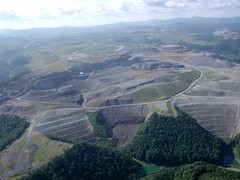The Clean Water Protection Act

The Clean Water Protection Act (H.R. 1837) is a bill in the U.S. House of Representatives which will sharply reduce mountaintop removal coal mining, protect clean drinking water for many of our nation’s cities. It will protect the quality of life for Appalachian coalfield residents who face frequent catastrophic flooding and pollution or loss of drinking water as a result of mountaintop removal coal mining.
From the east coast, to the west coast, to the states where it’s taking place, Americans want an end to mountaintop removal coal mining. Please contact your representative today and ask them to become a cosponsor!
Contact your Representative
 |
Snail-mailMake the most lasting impact with a hand-written letter. Enter your zip to start. |
 |
Call their officeUse our free auto-dialing tool to drop them a line. |
 |
Send a quick message with our online form. |
Congress at a Glance
 |
Who are your elected officials?Find answers to who, where, and why. |
 |
Connections to coalTrack campaign contributions from the coal industry to federal officials. |
Take Action
The most effective way to build support for the Clean Water Protection Act is by sending a hand written, supportive letter to your Representative in the House. For the fastest response to your letter, we recommend sending it to a district office.
Although it’s less effective, you can also use our free automated dialing tool to call their office, or send them an email with our new webform.
Regardless of how you contact your Representative, here are some important points to make:
- The Clean Water Act is meant to protect, not bury, our rivers and streams.
- To date, 500 of the world’s most ancient mountains have been leveled.
- EPA estimates that by 2010 a total of 1.4 millions acres of Appalachia’s mountains will have been destroyed.
- Across the Appalachian coalfields, more than 2,000 miles of streams are now buried and destroyed by mountaintop removal.
- The Clean Water Protection Act is necessary to protect clean drinking water for many of our nation’s cities.
- The Clean Water Protection Act is also necessary to protect the quality of life and economic security for Appalachian coalfield residents who face frequent catastrophic flooding, pollution, and loss of drinking water as a result of mountaintop removal.
Materials
- List of cosponsors from the 113th Congress
- Clean Water Protection Act (pdf)
- Representative Pallone’s (lead sponsor) floor statement (pdf)
- Clean Water Protection Act Dear Colleague letter from 113th Congress (pdf)
- New York Times editorial (pdf)
- List of newspaper op-ed’s against mountaintop removal
coal mining – courtesy of Ohio Citizen Action - Lobbying brochure – full color (pdf) – e-mail us for higher resolution files
- Outline of mountaintop removal sites over major US cities
Resources
 Latest news stories about mountaintop removal (RSS feed)
Latest news stories about mountaintop removal (RSS feed) Latest blog conversations about mountaintop removal (RSS feed)
Latest blog conversations about mountaintop removal (RSS feed) Blog posts about the introduction into the 111th Congress
Blog posts about the introduction into the 111th Congress News coverage of the introduction into the 111th Congress
News coverage of the introduction into the 111th Congress
In-depth
 In 1977, The Clean Water Act was enacted by Congress to “restore and maintain the chemical, physical, and biological integrity of the Nation’s waters.” For 25 years, the Clean Water Act (CWA) allowed for the granting of permits to place “fill material” into waters of the United States, provided that the primary purpose of the “filling” was not for waste disposal. As such, the CWA prohibited mountaintop removal operations from using the nation’s waterways as waste disposal sites.
In 1977, The Clean Water Act was enacted by Congress to “restore and maintain the chemical, physical, and biological integrity of the Nation’s waters.” For 25 years, the Clean Water Act (CWA) allowed for the granting of permits to place “fill material” into waters of the United States, provided that the primary purpose of the “filling” was not for waste disposal. As such, the CWA prohibited mountaintop removal operations from using the nation’s waterways as waste disposal sites.
That changed in 2002, when the Army Corps of Engineers, under the direction of the Bush administration and without congressional approval, altered its longstanding definition of “fill material” to include mining waste. This change accelerated the devastating practice of mountaintop removal coal mining and the destruction of more than 2,000 miles of Appalachian streams. More than 400,000 acres in West Virginia alone have been leveled, and the EPA Estimates that by the end of the decade a total of 1.4 million acres of Appalachia’s mountains and hardwood forests will be destroyed by mountain removal mining, which is an area the size of of Delaware.
In May of 2002, in response to the Army Corps’ rule change, The Clean Water Protection Act was introduced into the House of Representatives by Rep. Frank Pallone Jr. (D-NJ) and Christopher Shays (R-CT). Since then, it’s enjoyed a groundswell of bi-partisan support.
Robert F. Kennedy, Jr. of Waterkeeper Alliance put it succinctly:
“The Clean Water Protection Act is the first broad Congressional initiative aimed at reversing the Bush Administration’s eight-year effort to savage our national waterways and the popular laws that protect them.”
On May 8, 2002, the Clean Water Protection Act was introduced in to the 107th Congress with 1 original cosponsor and ended that session with a 36 cosponsors. On March 4th 2009, Congressman Frank Pallone (NJ), Congressman John Yarmuth (KY), and Congressman Dave Reichert (WA) introduced H.R. 1310 with 117 original cosponsors in the 111th Congress. Because Representatives from around the country received thousands of letters from people like you, it had a record 173 cosponsors by the end of the 111th Congress.
For more information contact Appalachian Voices at 828-262-1500 or www.appvoices.org.









